Sabbath & Holidays
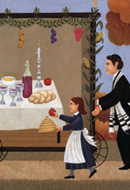 Be Joyful
Be JoyfulTuesday, September 21, 2010 by Yehudah Mirsky | Jewish Ideas Daily » Daily Features
Alongside the more colorful and distinctive rituals of the Sukkot festival—the taking-up of lulav and etrog, the sukkah itself—there is another command, less concrete and more penetrating: "And you will rejoice." Indeed, the passage in Deuteronomy (16: 14-15) concludes, v'hayita akh sameah, translatable as "you will be altogether joyful," or even "you will be only joyful."
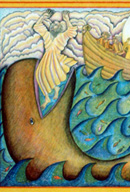 Jonah and Yom Kippur
Jonah and Yom KippurWednesday, September 15, 2010 by Meir Soloveichik | Jewish Ideas Daily » Daily Features
Read in its entirety in the synagogue in the afternoon of Yom Kippur, Jonah is the only multi-chapter book of the Bible to be so honored. Indeed, one commentator, observing that the brief Torah reading that precedes Jonah has little to do with the day, but merely continues where the morning reading left off, has suggested that this may be precisely in order to emphasize that, in a departure from the usual priorities, the haftarah, or prophetic portion, is in fact the critical text for the occasion. But what makes it so significant, and what lesson does it really teach about Yom Kippur?
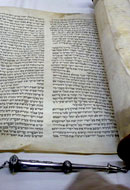 Orthodoxy and Innovation
Orthodoxy and InnovationMonday, September 13, 2010 by Aryeh Tepper | Jewish Ideas Daily » Daily Features
For many religiously observant Jews, the traditional siddur, or prayer book, constitutes a problem. One such Jew was the great hasidic rebbe, Nahman of Bratzlav (1772-1810), who articulated the problem in terms appropriate to his time: the fixed prayers, with their praises and petitions, are like a well-traveled highway, and well-traveled highways attract robbers. By which he meant that excessive routine makes it difficult to concentrate the mind.
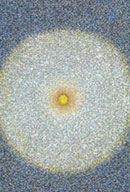 Creations
CreationsTuesday, September 7, 2010 by Yehudah Mirsky | Jewish Ideas Daily » Daily Features
Rosh Hashanah, the beginning of the year, marks the creation of the world. Or does it? The Torah refers to Rosh Hashanah, although not by that name, as the first day of "the seventh month" (Leviticus 23:24)—the seventh, that is, if you're counting from Nisan, the month of Passover. That month is designated as the beginning of the year in the first act of the Exodus: "This month will mark for you the first of the months; it will be, for you, the first month of the year" (Exodus 12:2). Like revolutionaries everywhere, the Israelites wanted a new calendar.
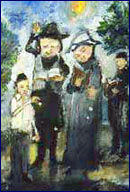 Repentance = Freedom?
Repentance = Freedom?Thursday, September 2, 2010 by Yehudah Mirsky | Jewish Ideas Daily » Daily Features
In the thick of the month of Ellul, nearing Rosh Hashanah, penitence is or should be in the air. Also recently marked was the 75th yahrzeit of the great mystic, jurist, and theologian Abraham Isaac Kook (1865-1935). As it turns out, Kook's teachings on the meaning of repentance are among his most striking, stamped with his distinctive mix of piety and audacity. In his eyes, teshuvah, generally translated as "repentance" but literally and more powerfully "return," signifies not only a deepened and renewed commitment to religion and commandments but, paradoxically, nothing less than a new birth of freedom.
Wednesday, September 1, 2010 by Moshe Sokolow | Jewish Ideas Daily » Weekly Portions
A well-known talmudic tradition reports that there are exactly 613 mitzvot (commandments) in the Torah. Of the total, 248 are positive (the do's), while 365 are negative (the don'ts). Not all the sages are in complete agreement on this enumeration, with some arriving at a higher number. But the custom has long been to speak of 613 mitzvot—or, in Hebrew, taryag mitzvot, based on the numeric values assigned to letters of the Hebrew alphabet. Ki Tavo: The Mystery of Goodness
Wednesday, August 25, 2010 by David Hazony | Jewish Ideas Daily » Weekly Portions
By David Hazony Nearing the end of his farewell address to the Israelites, Moses describes a peculiar ceremony they are to perform after entering Canaan.Shoftim: Judgment Call
Wednesday, August 11, 2010 by David Hazony | Jewish Ideas Daily » Weekly Portions
"Judges and officers shall you make for yourself in all your gates," we are told at the opening of this week's reading, "and they shall judge the people with righteous judgment." The declaration seems obvious at first blush. Who wouldn't want righteous judges? Yet the Bible—more so, perhaps, than any other text of the ancient world—is singularly attentive to this issue of judges, making it into one of the central demands of the Torah.
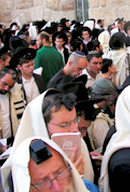 Tisha b’Av Now
Tisha b’Av NowMonday, July 19, 2010 by Yehudah Mirsky | Jewish Ideas Daily » Daily Features
Tomorrow is Tisha b'Av, the traditional day of fasting and lamentation for the destruction of the First and Second Temples and the sorrows of Jewish history. But ours is a moment of unprecedented Jewish sovereignty and unparalleled Jewish prosperity. And so, many are asking, why bother?
Wednesday, July 14, 2010 by David Hazony | Jewish Ideas Daily » Weekly Portions
Standing in the desert of Moav, poised to send the Israelites into the Promised Land without his own titanic presence to lead the way, Moses begins his last and greatest speech.
Editors' Picks
Better Fasting through Chemistry Judy Siegel-Itzkovich, Jerusalem Post. Jerusalem researchers are testing a drug that may help Jews and Muslims on fast days.
On the Ninth of Av Frank Talmage, Commentary (October 1981). In Catalonia, the scene of centuries of Jewish hopes and horrors, a student of history is beset by a torrent of emotions. (PDF)
What Was Lost on Tisha b'Av Shlomo Riskin, Ohr Torah Stone. The Temple was not only a symbol of Jewish national sovereignty; it was the means by which the message of God was to be promulgated throughout the world.
Making Music to His Name Dennis Prager, Jewish Journal. Apropos the playing of musical instruments on the Sabbath: why did the rabbis proscribe what the Lord prescribed?
The Miracle-Worker of Mount Meron Nathan Jeffay, Forward. On Sunday, Lag B'Omer, masses of Israelis will flock to a Galilee hilltop to appeal for intercession at the grave of Rabbi Shimon bar Yohai.
The Broken Matzah Nathan Laufer, Jewish Lights. On the meanings contained in a powerful seder ritual.
Let Us Now Praise Famous Fish Stephen Gabriel Rosenberg, Jerusalem Post. Is the dish served by Ashkenazi Jews today the same that was eaten in ancient Egypt and longed for by the Israelites in the desert?
An Ethiopian Haggadah Ruth Eglash, Jerusalem Post. For the seder table: a traditional haggadah incorporating the saga of Ethiopian Jewry.
How Matzah is Made YouTube. Touring a Shmurah bakery in Lawrence, Long Island. And see the leading matzah factory in Israel.
Are Coffee and Dope Kosher for Passover? Dan Rabinowitz, Seforim. Two curious angles on the holiday custom of refraining from certain grains and legumes (kitniyot).

